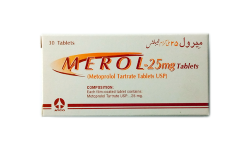ZYLORIC TABLETS
Irfan Traders exporter of Zyloric tablets at affordable and competitive rates. Zyloric Tablets contain the active ingredient allopurinol, a type of medicine that inhibits the conversion of purine (a substance found in high-protein foods, amongst other things) into uric acid. The excess of uric acid in the blood can cause several health problems, such as gout and kidney stones.
Description
In-Depth Analysis of Zyloric Tablets: Mechanism, Indications, Dosage, Side Effects, and Considerations
Introduction:
Zyloric tablets is a brand name for a medication that contains allopurinol as its active ingredient. Allopurinol is a xanthine oxidase inhibitor, and Zyloric tablets are commonly prescribed to manage conditions associated with excess uric acid production, such as gout and certain kidney stones.
This comprehensive overview will delve into various aspects of Zyloric tablets, including their pharmacology, therapeutic uses, dosage and administration, potential side effects, precautions, and interactions.
Pharmacology:
Allopurinol, the key component of Zyloric tablets, functions as a xanthine oxidase inhibitor. Xanthine oxidase is an enzyme involved in the production of uric acid, a substance that can accumulate in the body and lead to conditions like gout and kidney stones.
By inhibiting xanthine oxidase, Zyloric tablets effectively reduces the formation of uric acid, leading to lower levels in the bloodstream.
Therapeutic Uses:
Zyloric tablets are primarily indicated for conditions related to elevated levels of uric acid, notably gout and certain types of kidney stones. The therapeutic uses of Zyloric include:
- Gout: Zyloric tablets are a cornerstone in the management of gout, a form of arthritis caused by the deposition of urate crystals in the joints. By lowering uric acid levels, Zyloric helps prevent the formation of these crystals, alleviating symptoms and reducing the frequency of gout attacks.
- Kidney Stones: Zyloric tablets may be prescribed to prevent the recurrence of certain types of kidney stones, particularly those composed of uric acid. By inhibiting the production of uric acid, Zyloric reduces the likelihood of stone formation.
- Hyperuricemia: Zyloric can be used to manage elevated uric acid levels in conditions where there is an increased risk of uric acid crystal deposition, even in the absence of symptoms.
Dosage and Administration:
The dosage of Zyloric tablets is individualized based on the specific condition being treated, the severity of symptoms, and the patient’s response to the medication. It is essential to follow the healthcare provider’s recommendations and the instructions provided on the prescription label.
- Gout: The typical starting dose for gout is often 100 mg to 200 mg per day, with adjustments made based on uric acid levels and the occurrence of gout attacks. Maintenance doses may range from 200 mg to 600 mg daily.
- Kidney Stones: To prevent the formation of uric acid stones, the usual dose ranges from 200 mg to 600 mg per day, depending on the specific requirements of the patient.
- Hyperuricemia: In conditions associated with elevated uric acid levels without active symptoms, a lower maintenance dose may be sufficient.
Zyloric is usually taken orally, with or without food, and adequate hydration is often recommended to prevent kidney stone formation.
Side Effects:
While Zyloric is generally well-tolerated, like any medication, it can cause side effects. Common side effects include:
- Skin Reactions: Skin rashes are among the more frequent side effects of Zyloric. In some cases, these reactions can be severe, including Stevens-Johnson syndrome and toxic epidermal necrolysis.
- Gastrointestinal Disturbances: Nausea, vomiting, and diarrhea are reported side effects, though they are usually mild and transient.
- Elevated Liver Enzymes: Zyloric may, in rare cases, cause an increase in liver enzymes. Regular monitoring of liver function is recommended.
- Hypersensitivity Reactions: Anaphylaxis and other hypersensitivity reactions are rare but can occur. Patients experiencing severe allergic reactions should seek immediate medical attention.
- Renal Impairment: Zyloric may exacerbate renal impairment in some cases, particularly in patients with pre-existing kidney disease.
It is crucial for individuals to promptly report any unusual or severe side effects to their healthcare provider.
Precautions and Contraindications:
Certain precautions and contraindications should be considered before initiating Zyloric therapy.
- Hypersensitivity: Patients with a known hypersensitivity to allopurinol or its components should not use Zyloric.
- Renal Impairment: Caution is advised in patients with impaired renal function, and dosage adjustments may be necessary.
- Hepatic Impairment: Zyloric should be used with caution in patients with liver disease, and liver function should be monitored regularly.
- Pregnancy and Breastfeeding: Zyloric is generally avoided during pregnancy, especially during the first trimester, unless the potential benefits outweigh the risks. It is not recommended during breastfeeding.
- Bone Marrow Suppression: Zyloric may rarely cause bone marrow suppression, leading to conditions such as agranulocytosis or aplastic anemia. Regular monitoring of blood counts is crucial.
Drug Interactions:
Zyloric may interact with other medications, potentially affecting their efficacy or increasing the risk of side effects. Some notable interactions include:
- Azathioprine and Mercaptopurine: Allopurinol can increase the levels of these medications, necessitating dosage adjustments.
- Warfarin: Allopurinol may enhance the anticoagulant effects of warfarin. Close monitoring of prothrombin time is recommended when these medications are used together.
- Theophylline: Allopurinol may increase the levels of theophylline, requiring adjustments in theophylline dosage.
- Diuretics: The concomitant use of Zyloric with thiazide diuretics may increase the risk of hypersensitivity reactions.
Patients should inform their healthcare provider about all medications, including prescription, over-the-counter, and herbal supplements, before starting Zyloric.
Conclusion:
Zyloric, containing allopurinol as its active ingredient, is a widely prescribed medication for conditions associated with elevated uric acid levels, such as gout and certain kidney stones. Its role as a xanthine oxidase inhibitor effectively reduces the production of uric acid, preventing the formation of crystals that contribute to these conditions.
While generally well-tolerated, patients must be aware of potential side effects, precautions, and drug interactions. Regular monitoring and open communication with healthcare providers are essential to ensuring the safe and effective use of Zyloric.
As with any medication, individuals should consult their healthcare professional for personalized advice based on their medical history and current health status.






Reviews
There are no reviews yet.